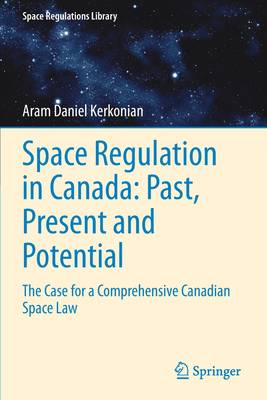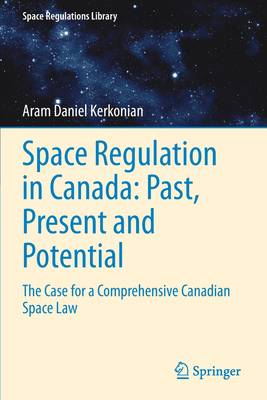
- Afhalen na 1 uur in een winkel met voorraad
- Gratis thuislevering in België vanaf € 30
- Ruim aanbod met 7 miljoen producten
- Afhalen na 1 uur in een winkel met voorraad
- Gratis thuislevering in België vanaf € 30
- Ruim aanbod met 7 miljoen producten
Zoeken
Space Regulation in Canada: Past, Present and Potential
The Case for a Comprehensive Canadian Space Law
Aram Daniel Kerkonian
€ 244,45
+ 488 punten
Uitvoering
Omschrijving
Space is no longer the domain of national space agencies. Today, a significant majority of space activities are carried out by non-governmental entities, resulting in the accelerated evolution of space technologies and their applications. This operational shift from public to private does not mean, however, that governments are no longer relevant in this era of New Space. On the contrary: as the operational role of the state has diminished, its regulatory role has grown correspondingly.
Acknowledging that the commercial landscape in space is an ever-changing one, this book explores how the Canadian government has adapted to the new commercial space landscape and whether it is prepared to fulfil its authorisation and supervision responsibilities as the regulator of Canada's space industry. The fundamental research question posed, therefore, is whether Canada's regulatory framework is appropriate given the increasing commercialisation of space. To best answer this question, the book provides a doctrinal analysis of Canada's historical space policy and current space laws, an empirical survey of the perspectives of those currently interacting with Canada's regulatory framework, and a comparative exploration of how other jurisdictions oversee commercial space activities.
Motivated by legal, moral and economic considerations, the book recommends that Canada enact a comprehensive national space law and provides an annotated draft law for this purpose. By doing so, the book intends to spark a meaningful conversation on how Canada ought to fulfil its regulatory responsibilities, a topic previously unaddressed in public and academic discourse.
Acknowledging that the commercial landscape in space is an ever-changing one, this book explores how the Canadian government has adapted to the new commercial space landscape and whether it is prepared to fulfil its authorisation and supervision responsibilities as the regulator of Canada's space industry. The fundamental research question posed, therefore, is whether Canada's regulatory framework is appropriate given the increasing commercialisation of space. To best answer this question, the book provides a doctrinal analysis of Canada's historical space policy and current space laws, an empirical survey of the perspectives of those currently interacting with Canada's regulatory framework, and a comparative exploration of how other jurisdictions oversee commercial space activities.
Motivated by legal, moral and economic considerations, the book recommends that Canada enact a comprehensive national space law and provides an annotated draft law for this purpose. By doing so, the book intends to spark a meaningful conversation on how Canada ought to fulfil its regulatory responsibilities, a topic previously unaddressed in public and academic discourse.
Specificaties
Betrokkenen
- Auteur(s):
- Uitgeverij:
Inhoud
- Aantal bladzijden:
- 436
- Taal:
- Engels
- Reeks:
- Reeksnummer:
- nr. 12
Eigenschappen
- Productcode (EAN):
- 9783030686949
- Verschijningsdatum:
- 29/03/2022
- Uitvoering:
- Paperback
- Formaat:
- Trade paperback (VS)
- Afmetingen:
- 156 mm x 234 mm
- Gewicht:
- 635 g

Alleen bij Standaard Boekhandel
+ 488 punten op je klantenkaart van Standaard Boekhandel
Beoordelingen
We publiceren alleen reviews die voldoen aan de voorwaarden voor reviews. Bekijk onze voorwaarden voor reviews.








